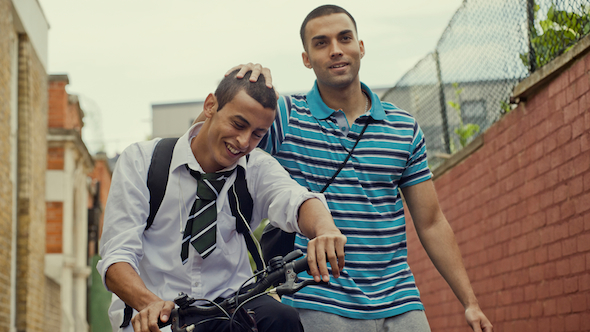
MY BROTHER, THE DEVIL (BFI London Film Festival)
The British Film Institute’s 56th London Film Festival has just closed with its new director, Australian Clare Stewart, shaking it up with some of the strategies she introduced in her five-year tenure at the Sydney Film Festival. Based on her first LFF, Stewart’s committed to increasing accessibility, expanding the audience, and enhancing the festival’s national and international profile. In her quest, the program and structure were markedly changed, the festival shortened and screened in more venues across the breadth of London with selected premieres and galas cinecast to screens across the U.K. And for the first time, 12 films took part in each new official competition for best film, first feature, documentary and best British newcomer.
The opening film, the world premiere of Tim Burton’s animation Frankenweenie, had an appropriate capital connection, produced at London’s Three Mills Studio, while the closing European premiere kept it in the family with Burton’s wife, Helena Bonham Carter, playing Miss Havisham in Mike Newell’s adaptation of Dickens’ Great Expectations. In between, 225 feature films and documentaries were packed into the 12 day event. After setting aside time for sleep and allowing a degree of selectivity, here are some of the highlights.
The best British newcomer Award was won by Welsh-Egyptian director/screenwriter Sally El Hosaini for My Brother the Devil. The film follows teenage brothers Mo (Fady Elsayed) and Rashid (James Floyd) living in their traditional Egyptian family home on a claustrophobic housing estate in East London. Rashid, a shrewd, charismatic gang member, deals drugs on the streets of Hackney. Younger brother Mo idolizes him, aspiring to follow in his footsteps, but Rashid’s determined that Mo tread a different path and get an education.
Set in an uncompromising world, against the clash of parental aspirations and the lure of criminality, El Hosaini elevates the film from the formulaic British urban gangster film. Dealing with universal issues of identity but rooted in an Anglo-Arab experience, the mature writing and direction of My Brother the Devil possesses a wonderful emotional truth that transcends the genre. James Floyd and Fady Elsayed give excellent performances as El Hosaini teases the story in seemingly predictable directions only to subvert expectations. The mix of professional and non-professional actors, a strong script rich in street slang, and the choice of locations create an authentic and immersive experience beautifully photographed by David Raedeker. Fresh and unconventional, lyrical and tender, My Brother the Devil is a worthy award winner.
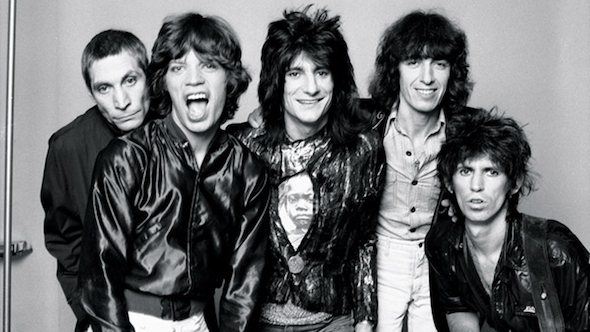
The Rolling Stones (Ken Regan/Camera 5)
Among the world premieres, Brett Morgen’s Crossfire Hurricane celebrated 50 years of sympathy for those old devils, the Rolling Stones, who turned out en masse for the screening simultaneously cinecast across the U.K. and Europe. With so many documentaries made about the Stones—such as the Maysles brothers’ Gimme Shelter (1970), Peter Whitehead’s Charlie is My Darling (1966), Robert Frank’s Cocksucker Blues (1972)—how do you retell the same story? Morgen (best known for The Kid Stays in the Picture) constructs the narrative from a chorus of audio interviews with the band reflecting on archive footage. The focus is on the first 20 years of their career, before their transformation into an institution when they still embodied counterculture. It combines some great footage from the established masterpieces, including sanitized excerpts from Cocksucker Blues, which is still subject to limited screenings with stringent restrictions because of the Stones’ objections to its revelations. Crossfire Hurricane covers familiar territory but reveals little new except insights into the Stone’s business acumen and their continued control over their image. It will be televised on HBO on November 15 while Peter Whitehead’s verité documentary The Rolling Stone–Charlie is My Darling, Ireland 1965, which premiered at the New York Film Festival in September, will be released on DVD on November 6.
Swedish Dogma director, Thomas Vinterberg’s excruciatingly tense psychological thriller The Hunt is his best film since his 1998 breakthrough, The Celebration (Festen), in which a family’s long-buried sexual abuse is publicly exposed. The Hunt revisits some of those themes with a neat plot inversion.
Teacher Lucas is much loved by his teenage son Marcus, his pupils, and close childhood friends in their close-knit rural Danish community. After a recent divorce and bitter custody dispute, Lucas’ well-meaning drinking and hunting buddies rally round him until a student, his best friend’s young daughter, accuses Lucas of sexual abuse. Despite his reputation and tenacious insistent of innocence, the community and the authorities believe the child, and the situation escalates out of control with Lucas subjected to discrimination and violence.
The Hunt explores the consequences of a false indictment through Mads Mikkelsen’s powerful performance as the alienated and demonized Lucas. As group hysteria grips the community, the viewer is certain of Lucas’ innocence and watches in sympathy for the accused and with an understanding of the accusers, who do not share our knowledge. This is the genius of the superbly structured script, co-written with Tobias Lindholm, that confounds expectations until the climax. Sumptuous cinematographer by Charlotte Bruus Christensen captures the pastoral countryside at odds with the turmoil beneath while precise editing keeps the story in focus. The caustic and disturbing thriller, inspired by a psychologist research paper, deals with difficult subject matter with considerable power, clarity, and subtlety, providing a timely contrast to tabloid hysteria. As with The Celebration, The Hunt will make you laugh, cry and scream in frustration. As of yet, it has no U.S. release date.
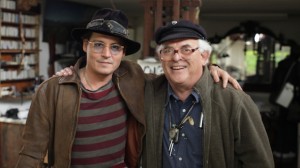
Johnny Depp and Ralph Steadman (All other photos: BFI London Film Festival)
The world premiere of For No Good Reason, Charlie Paul’s first feature after a successful career in animation and live-action commercials, competed in the documentary competition. You may not know the subject, British illustrator Ralph Steadman, by name but you will instantly recognize his illustrations from Hunter S. Thompson’s cult novel Fear and Loathing in Las Vegas. In this lavishly produced and stylized labor of love more than 15 years in the making, Johnny Depp guides us through the 76-year-old Steadman’s career and counterculture credentials.
Steadman’s vital art springs to life in animation seamlessly interwoven with archive footage and admiring interviewees, including Terry Gilliam, Bruce Robinson, Richard E. Grant and Rolling Stone’s Jann Wenner. Depp, a friend since he researched his role as Thompson for Gilliam’s film version of Fear and Loathing, watches Steadman channel his angst and bile into his work, coaxing surreal characters from ink splattered on paper while remonstrating how he desperately wanted to “change the world.”
After working on Private Eye, The Telegraph and Punch in the U.K., Steadman traveled in America in the 1970s. His fateful encounter with Thompson and their thorny but affectionate relationship that endured until Thompson’s 2005 suicide drives the middle of the film. In Thompson, Steadman discovered an equally riling voice with which to fight the system. Their article, “The Kentucky Derby Is Decadent and Depraved,” is regarded as the foundation of gonzo journalism.
Charlie Paul’s intimacy with Steadman allows us a fascinating glimpse of the artist in his studio diligently creating work that remains sharp and untamed. No longer aware of the camera, Steadman reflects on his other experiences, encounters, and achievements, including with the equally iconic William S. Burroughs, and his work on human rights that is overshadowed by the film’s emphasis on his friendship with the volatile Thompson. While Steadman repeatedly rues his perceived status as a “mere cartoonist” and, distressed in the wake of Thompson’s violent suicide, wonders whether his life’s work amounted to anything worthwhile, the viewers will be left in little doubt of his importance.
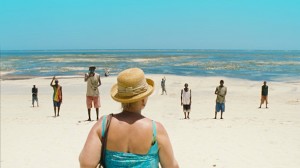
PARADISE: LOVE
The U.K. premiere of Paradise: Love, the first of controversial Austrian director Ulrich Seidl’s Paradise Trilogy, stars Margarete Tiesel as Teresa, an overweight, middle-aged, single mother on her first trip to a Kenyan beach resort. She’s initiated into the local culture by her experienced female companion. The main attraction of which is the sexual prowess of the local men, who loiter beyond the resort’s strictly patrolled beach. Naive and self-conscious, Teresa enters into sexual encounters looking for love but finds humiliation and well-rehearsed cons. Bruised but undeterred Teresa embraces her liberation as a “sugar mama,” hardening to the trade with each new lover.
Veronika Franz’s script constantly shifts our sympathies between the self-conscious, aging, and lonely women, who have spent their life caring for others, and the impoverished Kenyans’ need to feed their families. The beautiful saturated cinematography, by Edward Lachman and Wolfgang Thaler, references the monumental nudes of artists like Jenny Saville or Lucien Freud in lingering shots of the sexual exchanges that challenge the viewers to confront attitudes to aging and sexual commodification.
Margarete Tiesel is outstanding as Teresa, but all the performances are incredibly brave. In a painful scene of self-denial, Teresa tries to teach a lover the heartfelt sensuality she desperately desires but cannot buy. In another, after holiday friends deliver a young Kenyan to Teresa’s room to dance for her birthday, the sexual scene that plays out is truly shocking, turning from hilarity to pity and degradation.
The film becomes excruciating as unrelenting scenes mount up with Seidl pondering the question of “who’s exploiting who?” Complex and uncompromising Paradise: Love is by turns blackly comic, deeply tragic, and downright offensive. It provides no easy answers and resonates long after viewing. One of the most impressive and intense films of 2012, it also delivers a caustic critique of global consumer capitalism. Paradise: Love opens across Europe this autumn and will be released by Strand Releasing in the U.S. Paradise: Faith screened at Venice, and Paradise: Hope is scheduled for completion in 2013.
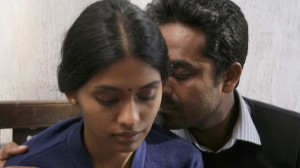
Anjali Patil and Shyam Fernando in WITH YOU, WITHOUT YOU
A notable entry among the world cinema screenings was With You, Without You. Written and directed by Prasanna Vithanage, Sri Lanka’s most notable filmmaker, the film is an adaptation of Dostoyevsky’s novella The Meek One a.k.a. A Gentle Creature, now set in post-civil war Sri Lanka. As the country continues to grapple with its past amid accusations of government atrocities, film content remains heavily constrained by state control, with scripts subject to approval by the Defense Ministry. Despite this, Vithanage has managed to produce an intimate and haunting reflection on contemporary Sri Lankan experience that is independent international cinema at its best.
In the central highlands, solitary, middle-aged, Buddhist Sarathsiri lives for his work running a pawnshop. When a young Tamil, Selvi, cashes in her last jewellery, she immediately captivates Sarathsiri. He follows her, a refugee from the warn-torn north, and discovers Selvi lives with her poor aunts who have arranged a marriage for her to an elderly man. Impetuously, Sarathsiri proposes and the couple elope, settling above his pawnshop. Slowly they build a life together burying the past and putting aside their religious differences until Sarathsiri’s old army friend arrives and a terrible secret emerges with far-reaching consequences.
Vithanage’s roots in directing for the theater before entering film in the early 1990s are evident in this confined and claustrophobic exploration of the civil war’s emotional impact on the lives of ordinary people. Fresh from her Bollywood break in Chakravyuha, Indian actress Anjali Patil’s is spellbinding as the traumatised Selvi. In his screen debut, Shyam Fernando, a veteran of Sri Lankan theatre, is restrained as Sarathsiri, desperate for redemption. Vithanage weaves a wonderful nuanced plot through the tight script, and their relationship is beautifully captured by M.D. Mahindapala’s lingering cinematography.
As the festival came to a close the new official competition honored Jacques Audiard’s Rust and Bone as best feature (a full review coming soon), Benh Zeitlin’s Beasts of the Southern Wild as best first feature, and Mea Maxima Culpa: Silence in the House of God by Alex Gibney winning best documentary.
Before I caught up on some sleep, I was amused by some of the audience reactions I’d overheard in the auditorium and the bar…
Beasts of the Southern Wild, with pint-sized actress Quvenzhané Wallis: “I’ll never get her name without the phonics.”
Midnight’s Children, the adaptation of the Salman Rushdie novel: “I was distracted by the prosthetics”
Rust and Bone with Marion Cotillard: “Any tissues left?”
Ben Affleck’s Argo: “Stop being picky. It’s a classic in waiting”
Ben Wheatley’s latest, The Sightseers: “A filmic cocktail mix”
The Australian musical comedy/drama The Sapphires: “TV?”






Always a great event. I hope to be lucky enough to attend it.